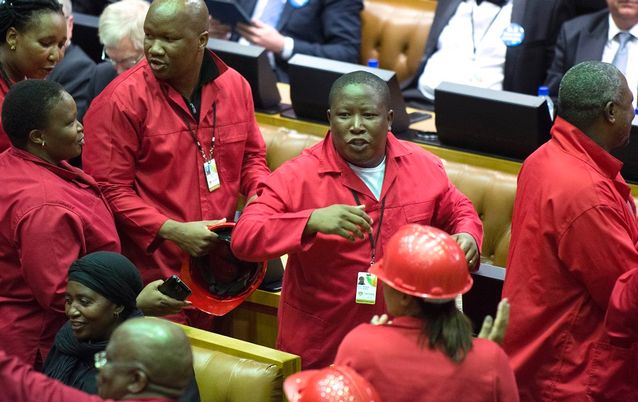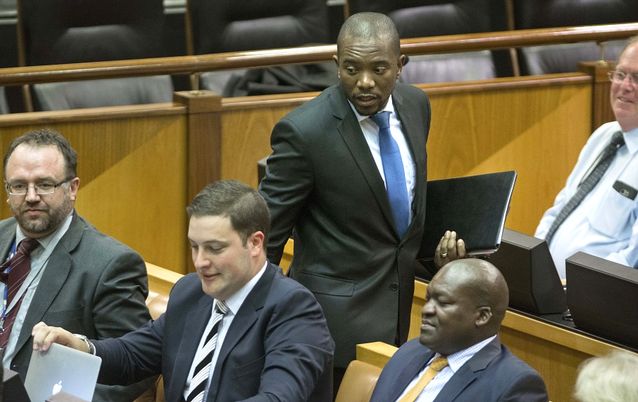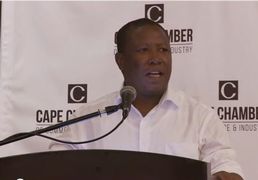Police may not remove MPs from Parliament, Constitutional Court rules
by Franny Rabkin,
2016-03-18 12:11:20.0
THE Constitutional Court on Friday declared unconstitutional a law that allowed the police to be called into Parliament to remove members for causing a disturbance.
The use of police to strong-arm Economic Freedom Fighters (EFF) MPs out of Parliament at President Jacob Zuma’s state of the nation address in February last year was widely criticised. The majority judgment of the Constitutional Court, by Justice Mbuyiseli Madlanga, was a strong affirmation for MPs’ freedom of expression in the house, saying that without it, the parliamentary system would be a "sham".
"That, in turn, would be pernicious to democracy," said Justice Madlanga.
The case concerned section 11 of the Powers, Privileges and Immunities of Parliament and Provincial Legislatures Act, which allowed the speaker of Parliament to order members of staff or "security services" to arrest and remove "a person" who was creating a disturbance in the precinct.
The Democratic Alliance (DA), which brought the case to court, argued that if "person" included MPs, the section was unconstitutional because the Constitution gave MPs freedom of speech in the house and immunity from arrest for anything they said in Parliament.
Justice Madlanga, after examining the act as a whole and its purpose, said "a person" did include members of Parliament and that the section was therefore unconstitutional.
He said SA’s constitutional democracy was "hard-won" and had come at a huge cost to many — "a cost that included arrest, detention, torture and — above all — death at the hands of the apartheid regime".
Debate was crucial for the performance of Parliament’s functions and should not be stifled. "Unless all enjoy the right to full and meaningful contribution, the very notion of constitutional democracy is warped," said Justice Madlanga.
However, he said there could still be rules and orders in place to ensure Parliament’s work was not hamstrung and that limited the parliamentary privilege of free speech. But the rules had to be "within bounds that do not denude the privilege of its essential content".
He said section 11 made the creation of a disturbance a criminal offence. "The spectre of not only arrest, but everything that may follow it, is real," he said. This could have a "chilling effect on robust debate", he said.
Justice Madlanga also interpreted section 11 to apply only to conduct that was "of a nature that hamstrings or incapacitates Parliament from conducting its business". Other kinds of disturbances were not affected by the section, he said.
"It cannot be all conduct that annoys and tests the patience of the presiding officer and some in Parliament that amounts to interference or disruption," he said.
He ordered that section 11 should be read as including the words "other than a member" after the word "person".
-

Economic Freedom Fighters members leave the National Assembly on Thursday. Picture: TREVOR SAMSON
-

TAKE A WALK: Democratic Alliance leader Mmusi Maimane was asked to leave the House when President Jacob Zuma was answering questions in the National Assembly on Thursday. Picture: TREVOR SAMSON
THE Constitutional Court on Friday declared unconstitutional a law that allowed the police to be called into Parliament to remove members for causing a disturbance.
The use of police to strong-arm Economic Freedom Fighters (EFF) MPs out of Parliament at President Jacob Zuma’s state of the nation address in February last year was widely criticised. The majority judgment of the Constitutional Court, by Justice Mbuyiseli Madlanga, was a strong affirmation for MPs’ freedom of expression in the house, saying that without it, the parliamentary system would be a "sham".
"That, in turn, would be pernicious to democracy," said Justice Madlanga.
The case concerned section 11 of the Powers, Privileges and Immunities of Parliament and Provincial Legislatures Act, which allowed the speaker of Parliament to order members of staff or "security services" to arrest and remove "a person" who was creating a disturbance in the precinct.
The Democratic Alliance (DA), which brought the case to court, argued that if "person" included MPs, the section was unconstitutional because the Constitution gave MPs freedom of speech in the house and immunity from arrest for anything they said in Parliament.
Justice Madlanga, after examining the act as a whole and its purpose, said "a person" did include members of Parliament and that the section was therefore unconstitutional.
He said SA’s constitutional democracy was "hard-won" and had come at a huge cost to many — "a cost that included arrest, detention, torture and — above all — death at the hands of the apartheid regime".
Debate was crucial for the performance of Parliament’s functions and should not be stifled. "Unless all enjoy the right to full and meaningful contribution, the very notion of constitutional democracy is warped," said Justice Madlanga.
However, he said there could still be rules and orders in place to ensure Parliament’s work was not hamstrung and that limited the parliamentary privilege of free speech. But the rules had to be "within bounds that do not denude the privilege of its essential content".
He said section 11 made the creation of a disturbance a criminal offence. "The spectre of not only arrest, but everything that may follow it, is real," he said. This could have a "chilling effect on robust debate", he said.
Justice Madlanga also interpreted section 11 to apply only to conduct that was "of a nature that hamstrings or incapacitates Parliament from conducting its business". Other kinds of disturbances were not affected by the section, he said.
"It cannot be all conduct that annoys and tests the patience of the presiding officer and some in Parliament that amounts to interference or disruption," he said.
He ordered that section 11 should be read as including the words "other than a member" after the word "person".































Change: 1.19%
Change: 1.36%
Change: 2.19%
Change: 1.49%
Change: -0.77%
Data supplied by Profile Data
Change: -0.19%
Change: 0.69%
Change: 1.19%
Change: 0.00%
Change: 0.44%
Data supplied by Profile Data
Change: 0.62%
Change: 0.61%
Change: 0.23%
Change: 0.52%
Change: 0.12%
Data supplied by Profile Data
Change: -0.21%
Change: -1.22%
Change: -0.69%
Change: -0.51%
Change: 0.07%
Data supplied by Profile Data